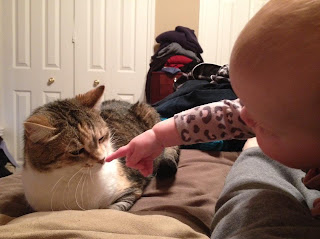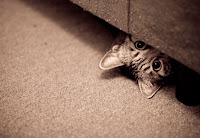Since babies are a big deal around E-Cats right now, this seems like an appropriate topic to write about! Many cats adapt quite well to new babies, but cats are creatures of habit and the chaos and excitement introduced by a new little one may make your cats disappear, or in some cases, eliminate inappropriately outside the litterbox. The most important tip is to try to keep your cats’ routines as close to normal as possible.
Second: Make sure that your cat is up to date on her vaccinations, is on a monthly parasite preventive, and has had a recent stool exam at the veterinary office prior to bringing the baby home. There are so many other things to think about with a new little one in the house that worrying about your cat’s health, or whether your baby could contract an illness from your cat should be dealt with before you’re distracted and sleep-deprived!

Slowly begin to introduce baby items into your home. Set up the crib ahead of time. Try to discourage your cat from sleeping in the crib, since he won’t understand why you want him to stop sleeping there once the baby arrives. Once the baby arrives, naps are best taken with the door shut, or with a crib tent; placed over the top of a crib. While a cat does not steal a baby’s breath, as myths suggest, it is safer to make sure that the cat does not have access to a baby while it is sleeping. Another option could be to install a temporary screen door on your baby’s room until the baby is more mobile. Below is a link to one such crib tent at our Amazon Affiliate page.
Allow your cat to investigate baby items, learning the scents of baby powder, formula, wipes and diaper cream.
While you are in the hospital, send home a used receiving blanket ahead of the baby so that the cats can become acquainted to the baby’s smell before they see him. When your cats investigate the blanket, give them praise or treats to reinforce calm, curious behavior about the baby versus fear.

One of the most disturbing things about a new baby, in a cat’s perspective, is the noise that babies make. Some cats run and hide when they hear a baby cry, others redirect aggressive behaviors to other members of the household – people or other cats – because they are stressed. It’s a great idea to get your cat used to the sounds of a new baby before they actually have to deal with it on a daily basis. You can go online and Google “baby cry sounds” or similar search criteria, or record the baby of a friend or family member. There is even a
CD of baby sounds available for purchase. Better yet, have someone visit with their baby – no pinching him to make him cry, though! Offer your cats treats while they listen to the sounds of babies crying.
If your cat is of the more delicate or dramatic temperament, you may want to place some Feliway diffusers in the baby’s room or near places in the home that the baby will spend time. Feliway is a synthetic pheromone that smells like the scent that cats leave in areas when they are marking things that they like.
 |
| Allow your cat to approach by choice |
Once the baby comes home, allow the cats to approach the baby on their own. Many cats, having had an introduction to scents and sounds of the baby prior to its arrival, will show hesitant curiosity and will come up to the baby and sniff it while you are holding her. Never leave your cats unattended with your baby. You may want to allow your cat to sit on your lap while you are feeding the baby so that you can talk to both your cat and your baby and make positive associations between the two.
Make sure that even amidst the changes to your life that you still find time to set aside just for your cats – grooming, playing or just sitting and enjoying each other’s company.
 |
| Give your cat a way around baby gates |
 |
| Give cats elevated escape from the baby |
While your baby is still non-mobile, start to plan for when the little one starts to move around on his own. Think ahead about how to keep cat food, water and litter out of reach of your baby but still easily accessible to your cat. Provide your cats with elevated perches or other areas where they can escape from curious little hands and mouths. Some strategically placed baby gates can allow cats access to escape areas by climbing over (or under) while keeping your baby safe. You may even want to create a quiet little cat paradise area well stocked with blankets and toys in a childfree zone.
 |
| Tails are not for pulling! |
You will also want to desensitize your cats to the kind of handling they might expect from small hands. Touch their faces, tails, toes, and in the ears and mouth – anywhere small hands might explore. This will decrease the likelihood that your cats will bite or slap at the baby if she gets to “fresh”. However, as much as you can train your pets to be tolerant, all animals, just like people, have a frustration threshold. You cannot teach an animal to endure repetitious pain, no matter how well-mannered they are. As your baby matures, small pats may become more vigorous or even become slaps. A 6 lb. baby sitting on a 12 lb. cat is more tolerable than a 20lb. child sitting on a 12lb. cat. You also have to teach your baby to be gentle and respectful of the pets in your home as well. There are
children’s books on the subject, and it is a good idea to teach your child the term “Gentle!” as soon as possible – it works with pulling people’s hair and hitting as well as with pulling kitty’s tail!
 |
| Teach babies as soon as you can to let a cat smell them before petting |

Also make sure to trim your cat’s nails well before the baby comes home. Some people may advise you to have your cat declawed if you are having a baby, for safety’s sake, but if you teach your cat and your baby mutual respect, you should have little to fear about your cat scratching your baby. In fact, putting your cat through surgery when it is already traumatized by the changes to the household may not be in the best interest of your cat’s health. Also, declawing cats over a certain age and weight can result in prolonged recovery – it can be done, but is a very unpleasant experience for your cat. If your cat’s paws are fully loaded and you are concerned, then you may want to try applying
Soft Paws to her nails. This allows your cat to keep her claws, while making them safe for baby. Be aware, however, that Soft Paws need to be changed about every 4-6 weeks or the nails, which are still growing beneath the colorful caps, will grow into your cat’s paw pads – which can both cause pain and infection.
If you are having trouble acclimating your cat to a new addition to the home, you may want to involve your veterinarian. The doctor may have additional suggestions for your individual situation, or in some cases a behavioral medication may be recommended.












